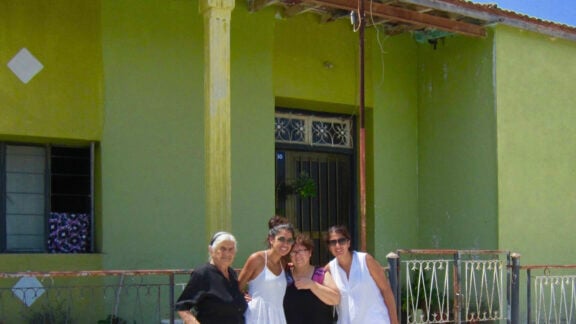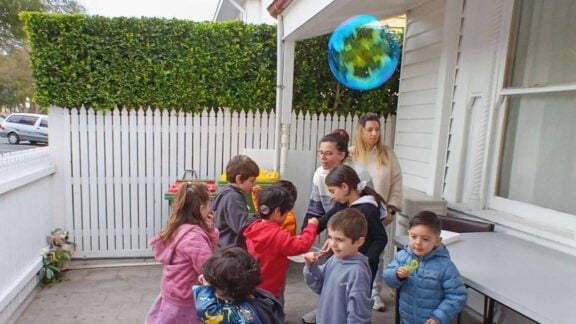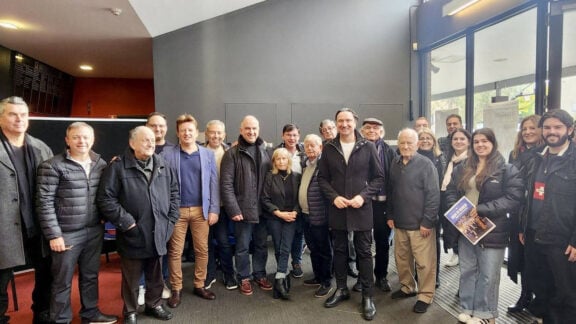It’s Neos Kosmos‘s birthday! It has turned 68 and, in an era, when everything is changing, our newspaper is trying to adapt to the demands of the times.
It still, of course, publishes in print three times a week, but the emphasis is shifting to its online presence.
And, of course, it continues to be the voice of Greeks in Australia, but to a certain extent also the wider diaspora in general.
We embrace the first, second and third generations with sensitivity and responsibility.
For the younger generation, it is worth recalling our history, briefly, as we have recorded it in previous years.
The first issue of Neos Kosmos was published on February 13, 1957.
Its publisher Dimitri Gogos, together with editor-in-chief Nondas Pezaros, Christos Mourikis, the staff and with the help of hundreds of left-wing expatriates who stood by Neos Kosmos in the difficult early years, had laid solid foundations for the newspaper to become what it is today, and we owe them our gratitude.
In 1993, Christos Mourikis wrote about the beginning of the newspaper:
“Symbolically, the publication coincided with the period when the migratory flow from Greece was constantly growing. Neos Kosmos was published on the initiative of Dimitris Gogos and with the warm support and backing of numerous people, who saw the need for a genuine immigrant, progressive and pro-labor newspaper.”
A close associate of Gogos and an essential co-editor was Nondas Pezaros. The two of them carried the burden of publishing and maintaining the newspaper in the first difficult years. Neos Kosmos championed the rights of immigrants, spoke militantly and courageously in a language that reached directly to the heart, mind and problems of immigrants.
Nondas himself, the only one who is still alive, wrote:
“Neos Kosmos listened to the mass of new immigrants, became one with them, became a new immigrant himself, walked alongside them through the difficult years and fought for their just demands.
“To the official policy of assimilation, we opposed the policy of multicultural Australia, and life vindicated us.”
For starters, Nondas Pezaros, editor-in-chief of the newspaper since the first issue, wrote in the 30th anniversary edition that he arrived in Melbourne in November 1956 and was an accountant by profession.
“I was introduced to Dimitris Gogos and he suggested to me, as he suggested to Gabriel Sarigiannis and Charilaos Pavlou, that we help him with the newspaper he was planning to publish under the name Neos Kosmos.
“So from February 1957 I went from being an accountant to a newspaper writer.”
I have heard and read a lot about the beginnings of the newspaper.
If I understand correctly, the title was in Gogos’s name, the company in a subsidiary of the Australian Communist Party called Greek-Australian Publications with several left-wing expatriates as shareholders.
Later, sometime during the split of the party after the Soviet invasion of Czechoslovakia in 1968, always by decision of the party, the title was passed to another company, Ethnic Publications, with Dimitris Gogos as the main shareholder, Nondas Pezaros as the second and Christos Mourikis as the third.
The late Dionysis Sykiotis told me that he was one of those who signed off on this transfer to the three of them, so that the newspaper would not be closed.
Nondas Pezaros told me that he himself started at the newspaper without a salary.
“Sometimes I even borrowed tickets to go down to the city by train,” he told me.
Today, whether on our computer or our mobile phone, we press a button and have the latest news in front of us.
THESE WERE DIFFICULT YEARS…
Again, Nondas informs us that an old man was collecting news from the Greek countryside and sending it to Australia so that Neos Kosmos could write to her.
“I don’t know if he sent them by ship or by air.”
Later, when the newspapers came from Greece three times a week, we cut out their pages as they were and republished them…
Today, in the age of the internet, all of this is over. The newspaper collaborates with agencies from which it obtains news and photos.
Those early years were particularly difficult. Nondas told me that the first issues were prepared at the printing house of the Australian Communist Party, Coronation Press.
“We wrote on a bench and did everything… I basically did it alone. Unpaid. The others had jobs. They didn’t want to leave them.”
Nondas on writing and Gogos running around with finances and the rest.
They would make bundles of the few newspapers that were printed at the time, and passing neighbours would pick them up and sell the ‘New World’ to General Motors, Holden, other factories, and train stations.
At that time, ships brought thousands of immigrants and Neos Kosmos talked about everything that affected them.
That, to a large extent, is the reason for its success.
The colleague, Babis Stavropoulos, had argued the following in a note:
“In my opinion, the secret of success is due to the fact that a purely left-wing newspaper made a breakthrough by addressing a conservative and right-wing majority of its readers. It spoke of a better and fairer society and of a different ideology than the one that sent them as immigrants to Australia. It was for the workers and against the employers (even when the latter were right), it advised them to join the unions and to demand higher wages and better working conditions together with the other workers. With a few words, ‘Neos Kosmos’ said yes to everything that other publications said no to at the time.”
So, with Gogos at the helm, with Nondas in charge of the material, and a little later with Mourikis and a very dedicated staff, as well as many volunteers in the early years, Neos Kosmos created a lifelong relationship with the newly arrived Greeks.
A relationship that developed and grew along with the problems and dreams of many people who found themselves thousands of kilometres away from Greece, seeking a better fate. And that continues today with their children and grandchildren.
The newspaper also receives criticism.
“Neos Kosmos has changed. It’s not the newspaper it used to be anymore,” say our critics.
In some cases, they are not wrong.
The bottom line, however, is that fortunately we have changed! If we hadn’t changed and adapted to the new conditions, we probably wouldn’t exist today, just as many Greek newspapers that were published in Australia have disappeared.
During the 68 years of Neos Kosmos‘s existence, at least ten other local newspapers were published. Some lasted for decades. Today, they no longer exist.
Times are not favourable for newspapers. There is a significant decrease in their circulation all over the world. Especially in Greece.
The situation could be just as bad for Neos Kosmos since it appeals to an aging and declining population. And yet the newspaper endures.
Certainly, there are problems and challenges. We are fighting a battle every day. The coming years will be decisive.
Despite the enormous changes taking place in the media sector, and especially in newspapers Neos Kosmos insists:
– It listens carefully to society and adapts to new conditions, but remains faithful to the values it inherited from its creators: Objectivity, responsibility and respect for readers
– We listen carefully to our readership and try, despite any weaknesses, to record and highlight the issues that concern them.
Besides, the readership is our only strength. We take our line from you and from no one else: Neither from parties nor from institutions nor from businesses.
Today, many of the newspaper’s readers, who supported it in its first difficult years, as well as businessmen, but most importantly, the people who created it, are no longer with us.
They would however, feel vindicated that this publication, which was published during the difficult years of mass post-war immigration, with primitive means and initially with a few pages, continues, not just to exist, but to be the voice of Hellenism in Australia.
It is, without a doubt, the largest Greek newspaper in the Diaspora with a circulation, even today, that is envied by most Athenian newspapers.
And we are not limited to just its three printed editions (with the Saturday edition being bilingual in Greek and English) but we have a strong and ever-growing presence on the internet. We are read everywhere: Many tens of thousands of readers in Australia, Greece and wherever there are Greeks abroad, trust Neos Kosmos for their information (in Greek and English).
Seven days a week, 24 hours a day, there is a constant stream of news with an emphasis on the Australian Greek community and the Hellenism of the diaspora in general.
As ownership and management of the newspaper passed to Christoforos Gogos, we ’embrace’ the new technology, serving our old loyal readers as devotedly as possible and reaching out more coherently to our new readers, mainly in the English language.
Neos Kosmos, the bilingual tri-weekly newspaper of Hellenism in Australia, has many reasons to feel proud.
Since the first issue of Neos Kosmos was published in 1957, much has changed in the newspaper’s appearance, its subject matter, and its English language. However, the basic principles of the newspaper have not changed.
Neos Kosmos remains a newspaper that, from its inception to the present day, has not been limited to its journalistic role alone, and perhaps this explains its unbreakable relationship with its audience. In the 1960s, it even went so far as to organise soup kitchens for unemployed Greek immigrants. It also took the lead in the struggles for our national issues, and the philhellene positions of all Australian governments are no coincidence. It had particularly strong anti-dictatorial activity and, among other things, contributed to the touring of Andreas Papandreou, Mikis Theodorakis and other resistance fighters in Australia at the time.
Later it pioneered the creation of a Chair in Modern Greek Studies at the University of Melbourne, but -most importantly- in the establishment of multiculturalism.
The Labor Party, after Gough Whitlam came to power in 1972, adopted many of the ‘New World’ proposals for the establishment of multiculturalism. Policies that were later continued and strengthened by the Liberal Malcolm Fraser. The lifting of the ban on naturalisation of Australian citizens for immigrants who developed political activity, the transfer of pensions abroad, the creation of SBS and the funding of immigrant schools, were some of the ‘New World’ campaigns that were successful. And it is no coincidence that the first license of the radio station 3EA (it was the beginning of SBS) was issued in the name of Dimitri Gogos.
Our struggles for immigrants and multiculturalism have not stopped and will never stop.
After the years of mass post-war immigration other needs arose. We took the lead in creating ‘Pronia’, from which ‘Fronditha’ was subsequently created, the first fundraisers for which were held in our offices. And thus the first nursing homes were built.
We have supported and continue to support efforts to preserve our language and multiculturalism. Even the fact that Greek was included in the unified curriculum of the Australian education system is due to the thousands of signatures collected by the readers of Neos Kosmos.
We collected over 20,000 signatures.
Neos Kosmos participated in the creation of the ‘Hellenic Week’ and, later, the Antipodes Festival.
Circumstances have changed since then, but our basic philosophy has not. And today the newspaper is on the side of pensioners, the weak and the underprivileged.
We fight for their rights.
But together with the young people, we are also fighting for our language and the preservation of our cultural traditions.
And we are always on the side of Greece and Cyprus.
And a request: When we say that we are “your voice”, it is not a figure of speech or to tickle your ears! We believe it!
That’s why we invite you to communicate with us, to inform us, to criticise us, to question us. Be with us. We hear you and together our “voice” becomes stronger!









